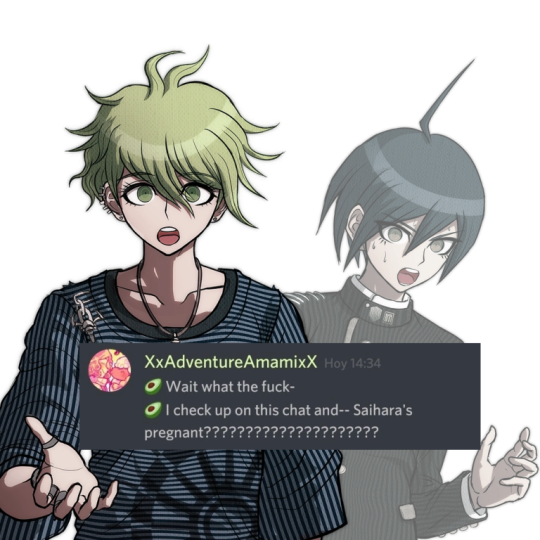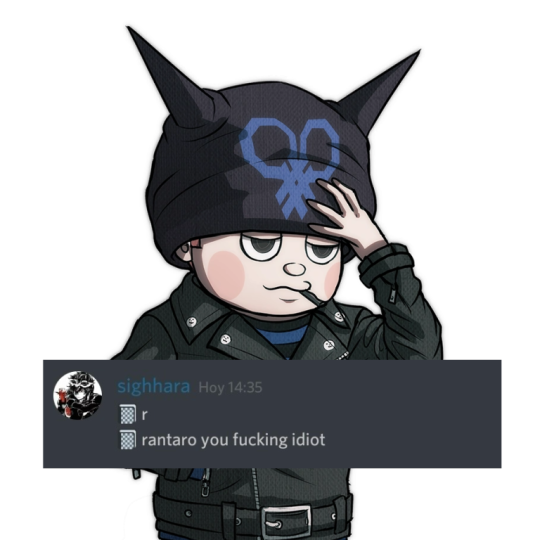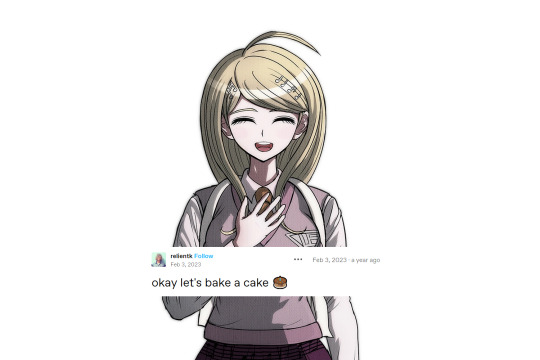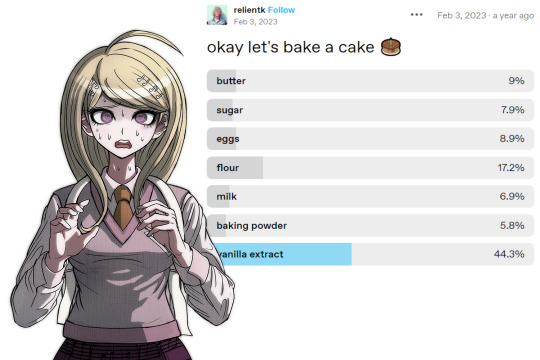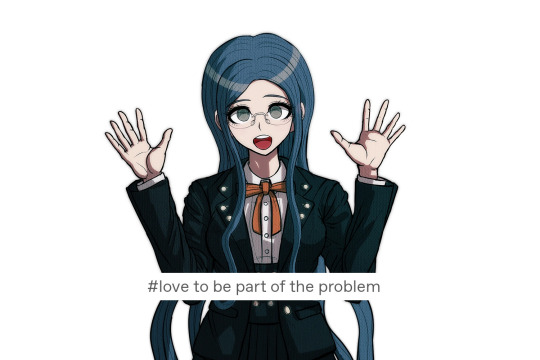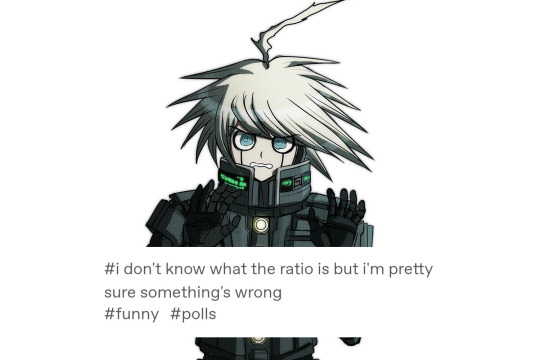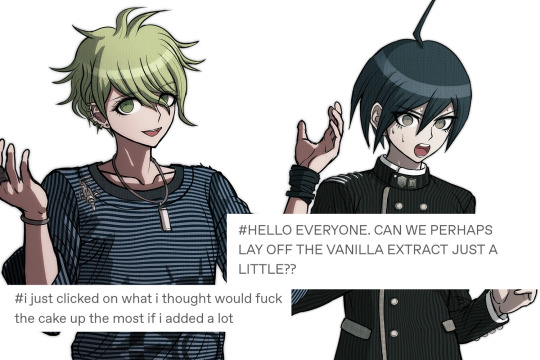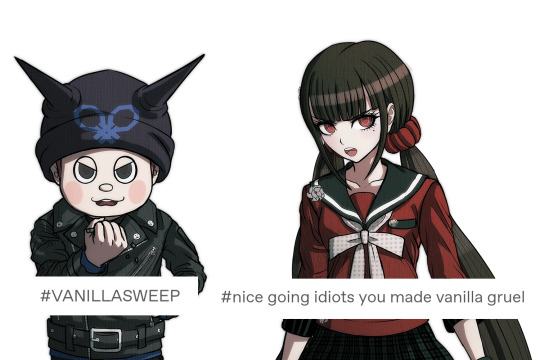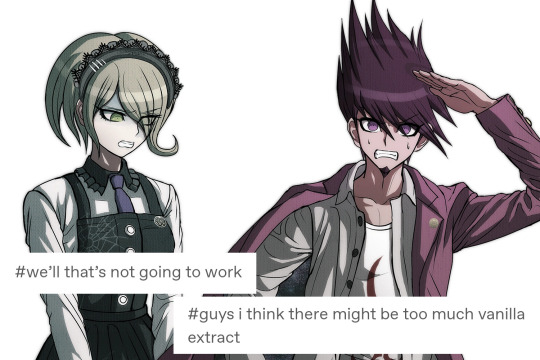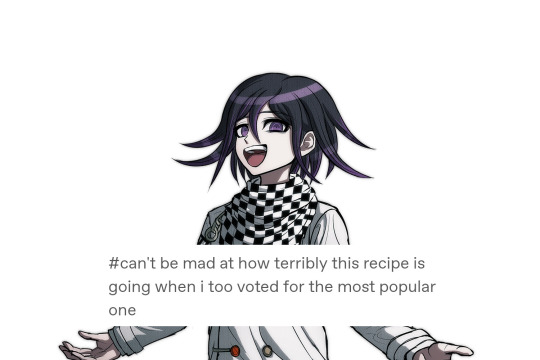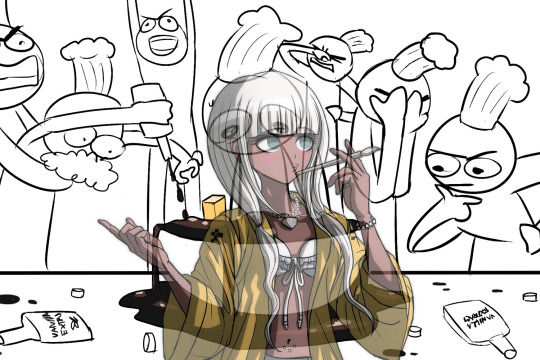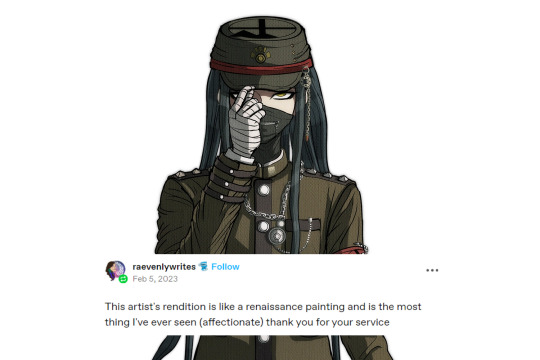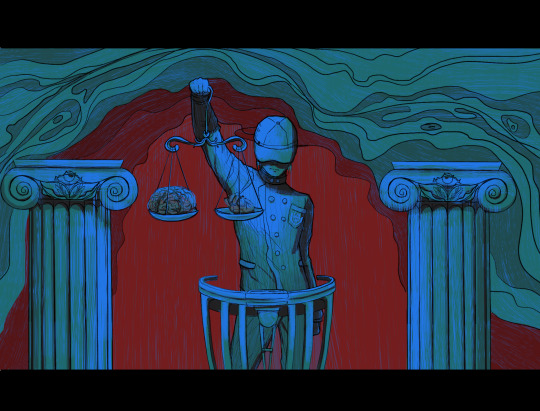Note
flaneile’s comment about “Oh. Oh thats gore. Thats gore of my comfort character.” Was so accurate cus oh my GOD THAT WAS SO HEIGHWJFBS???
Im going to EXPLODE /pos OH MY GODDD THIS ID SO BANGER HOLY CRAP WHAT THE HECK OHTHEITHEJFBD IH MY GOD??? OH MY GOD??? I AM SO BAD AT OUTTINT WORDS INTO THOUGHTS BUT?? OMG??? BDIABFBWHS????
(ゝω・´★) !!! I KNEW the people would like it !! and theres plenty more where that came from ;3c
7 notes
·
View notes
Text
I'm not normal
do you ever think about the fact that a good amount of people know shuichi (or at least his name) due to being born to a actor and screenwriter and the murder case he solved
or are you normal
13 notes
·
View notes
Text
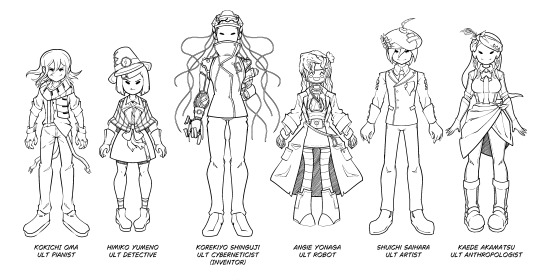
DR DEMIX V3, AKA: 214
Lineart Teasers, Part 1 - Kokichi, Himiko, Korekiyo, Angie, Shuichi, and Kaede
See Design Documents below: (Shuichi and Kaede text only for now)

Shuichi: Charcoal artist. Design subject to change. Wears his smock under his vest. He draws on his wrists and whole arm often. Prefers to use charcoal and pencils to draw with. Likes the absolute of black n white. Learning to use greys...
Kaede: Anthropologist with a strange expertise in studying kingdoms and dictatorships. Wears many trinkets from her adventures hanging out with kings and learning of how they and their subjects tick (peacock feather from minor Indian princedom, headscarf from the Former Kingdom of Novoselic, Sarong from Brunei, earrings from Oman)

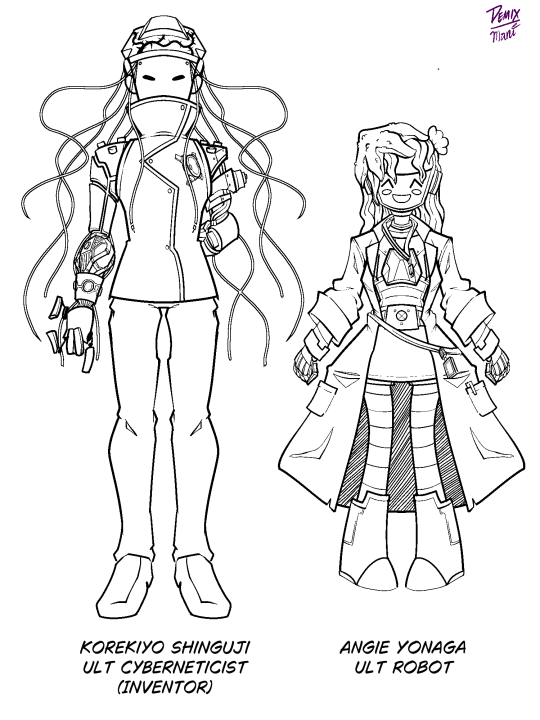

149 notes
·
View notes
Text

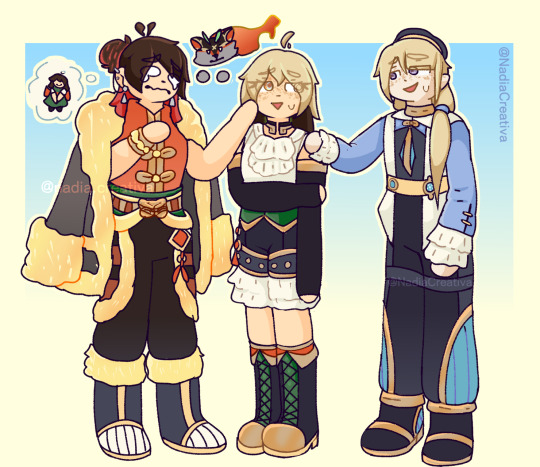
🔥🪨🧊
Crumbs of this future au :D
I think gaming would be a parent who is anxious that his child will do the same thing to him (run away from home just like him)
Meanwhile, Femi is more relaxed with what the child chooses.
52 notes
·
View notes
Text
pls someone tell me is normal to project into your fav characters (aka, shuichi)
4 notes
·
View notes
Note
*reads impermanent attachment and love letter*
"poor shuichi 😭, but there's no way it can get any worse, right?"
*reads turning in circles*
"... oh shi-"
Hey it could've been worse! It could have been my original plan for TC. That one was basically love letter but just. time loop. TwT" she actually Tried to keep him alive in that one
9 notes
·
View notes
Note
Can you please do some headcanons on Shuichi and some of the V3 cast being affected by the Despair disease? Shuichi being a meaner version of Togami and says mean to stuff to the remaining cast that are surprisely true about themselves. Like taking their flaws or insecurities and slapping them in the face.
I decided to just write the whole Cast being affected with it, hope that’s okay! But poor Saihara, I can’t imagine him doing those things.
Fair Warning: Some Minor Spoilers from SDR2 and Spoilers for the Mastermind in V3!
V3 Cast Getting Infected With the Despair Disease!
Kaede Akamatsu
Pessimistic Disease
Kaede is normally a veryoptimistic leader-type who sometimes forcefully pushes her friends towards uncovering the Mastermind and finding the truth, but after being affected by the Despair Disease, all of those leadership qualities will be discarded.
Her firm, strong-willed character disappears and is replaced by a much more pessimistic version of herself. Kaede will have a weak mind and feel no motivation in this Killing Game.
Kaede is convinced that they are all going to die here and succumbs to the very Motive behind the Despair Disease as she falls into Despair and completely gives up.
On top of her pessimistic attitude, Kaede no longer cares about the well-being of her classmates and becomes quite selfish. In her eyes, nothing they do in this Killing Game matters because they will all either die or be trapped here for the rest of their lives. She sees no reason to fight since it all seems pointless to her, anyway; and doesn’t want to give the others a false sense of hope and security.
Kaede has no desire to motivate the others and couldn’t care less about who dies or becomes the Blackened and who lives. She has also seemingly convinced herself that, “I’ll be the next victim anyway.”
She becomes much less brave and more willing to give up her life because she no longer sees a real reason to try or live.
Kaede also becomes increasingly irritable and vulgar, especially towards her classmates. Any positive attribute she had before getting infected seemed to be a thing of the past.
Overall, she doesn’t trust the others whatsoever and puts her guard up, not letting anyone get close to her - especially including Saihara Shuichi; she considers him to be the most sketchy out of all of them and believes that he has something to hide involving his Detective talent. Kaede develops a strong hatred for her classmates and detests being around them, nevertheless speaking to them.
After being infected with this Disease, she no longer has any faith in their situation and reverts back to her previous self.
Saihara Shuichi
Crude Disease
After being infected with the Despair Disease, Saihara will become increasingly over-confident and even somewhat cocky, believing that he has a place above the others and that they are inferior to him.
Before, he was anxious and a bit reserved, but now Saihara demands to be the center of attention and talks down to the rest of the participants. Any fear that he had before subsides and he no longer has any issues with social interaction or insecurities.
He also refuses to use his talent for beneficial purposes, believing that everyone else’s talents are pointless while his is the most valuable one here, and that they should be begging him to use his abilities to help them.
In Saihara’s eyes, they would have been dead by now if it weren’t for him and he shouldn’t waste his talent on useless individuals.
However, this causes him to believe in himself a little bit too much which actually alters his skills and diminishes his talent.
Saihara can be incredibly mean at times, using his talent to uncover the other’s insecurities and then using that against them. He also isn’t afraid to expose the others or belittle them with facts about themselves that are surprisingly true, being far too brutally honest with the others and definitely stepping over some sensitive lines.
He isn’t nearly as serious as he was before, often making dark jokes about their situation or taking breaks to poke fun at the remaining cast. Saihara comes across as incredibly crude and downright evil, causing the others to avoid him rather than flocking to him for help and support.
Instead of making logical decisions, Saihara puts blind faith into his abilities and goes off of hunches, as well as wildly accusing the other students and talking down to them like they are children.
He also shows little fear about their situation, not taking it as seriously as he should and shrugging off the Trials. If someone gets something twisted or accuses the wrong person, he will also call them, “Stupid” or “Idiotic” and laugh in their face.
And with improved people-skills, Saihara not only comes across as rude and mean, but can also come off as a bit flirty and confident, possibly too confident for his own good.
Maki Harukawa
Compassionate Disease
Before, Maki was an incredibly reserved and sometimes hostile person who showed little to no empathy. Now, however, she is always seen with a big, bright smile on her face and an overly preppy, bubbly attitude to boot.
Maki shows a great love an adoration for everything around her and cares about them way too much.
This isn’t limited to people, though, and she also shows love towards inanimate objects and animals as well. She is shown to be greatly affected whenever one of her classmate’s is in a bad mood or gets injured and can be seen talking to plants and animals.
Maki cries easily and at nearly everything in an almost childlike, immature way. She is much less serious and more carefree, even acting like a child at times.
Overprotective of her loved ones, which is everyone, she is constantly checking up on the other students to make sure that they are okay and asking them how their day was, providing emotional support if they need it. She may also pry if you try shooing her away.
Maki is overly friendly and just wants everyone else to get along. She has no tolerance for violence or hostility of any kind and often breaks up fights, getting extremely emotional whenever her classmates argue.
After all, she feels way too much and is much more sensitive now than before, all of her emotions are much more intense and even the smallest thing can send her over the edge. Maki follows her heart much more than her mind.
She can be a bit air-headed at times and come off as oblivious, not always understanding the weight of the Killing Game.
She is also much more attached to the others, especially Kaito. She is constantly bringing him gifts and clinging onto him even when he doesn’t want her around, and often giggles like a school girl whilst blabbing on and on about how much she loves not only Kaito but everyone else here.
Needless to say, once Maki was finally cured, she was disgusted with herself for acting this way. She refused to believe that she could actually be like that, Disease or not.
Ouma Kokichi
Honest Disease
Despite his talent as an Ultimate Supreme Leader, once exposed to the Despair Disease, Ouma won’t be able to stand evil motives and wishes to rid the world of any and all negativity and evil-doers. He also positively motivates his classmates to finding the Mastermind.
Ouma is extremely compassionate and shows love for his friends, and could never imagine doing anything to hurt them.
And most importantly, with this Disease he must only tell the truth. He can’t lie about anything, no matter how minor, and even if he wanted to lie, he wouldn’t be able to because the Disease wouldn’t let him;.
He is obligated to be one-hundred percent truthful, one-hundred percent of the time.
He sticks up for others when they are being tormented, demanding that the other leaves them alone and finds someone else to pick on. He can’t stand seeing others torment his friends.
Ouma becomes very serious and mature, as well as becoming much less eccentric. He is no longer the over-dramatic character that we have all come to know.
He can’t tell when others are lying so he often blindly trusts them and is easily manipulated; he becomes quite oblivious and rather innocent.
And Ouma himself becomes a bit dumb and all of his skills disappear - he turns into an awful liar. Since the Disease won’t let him lie, it makes it obvious when he tries bending the truth so that anyone would be able to read him like a book.
He’ll start sweating and fidgeting nervously, his voice rises and he looks increasingly uncomfortable and worried. When he gets called out, Ouma will become frantic and shy.
All he wants is for everyone else to remain positive in their situation, taking up a Protagonist-like role in this scenario.
Ouma is also one who becomes really uncomfortable when he’s finally cured. “Damn, I wonder what kinds of secrets I spilled!~” he giggles nonchalantly.
Himiko Yumeno
Energetic Disease
Normal Himiko is quite lazy when it comes to anything but magic, but the Despair Disease flips that. She has a ‘too the max’ personality about anything and everything as she bounces off the walls with energy, but she shows very little interest in magic.
Eventually, she’ll just admit that she isn’t a real Mage and that all of her Magic as well as Magic as a whole is fake, going so far to reveal the secrets behind all of her tricks without a care in the world.
Of course, once she’s finally cured of the Disease she tries casting a ‘Forgetting Spell’ on the others to cover-up her secrets.
When she’s infected, though, Himiko is extremely intelligent and instead of being ‘slow’ she’s normally one of the first people to catch onto suspicious behavior.
In a lot of ways, her intuition improves and she replaces Saihara as the most valuable student in the Killing Game.
Himiko is always full of bountiful energy, never tired nor is she lazy. She is loud and somewhat crass, always making her presence known.
All she wants is for the others to try their best and can get easily angered, especially when trying to encourage her friends. Himiko is probably the most motivated out of all of them to succeed.
She matures greatly and becomes much more serious, no longer making time for childish things and dropping her whole ‘I’m a Real Mage!’ act.
Her personality is similar to that of Tenko Chabashira’s real personality in the sense that Himiko has an extreme nature, and she isn’t afraid to go out of her way in hopes of motivating her friends, sometimes coming across as too intense or out of line.
She no longer feels any real need to sleep, and because of this Himiko will be even more tired than usual once she finally does get cured of the Disease. But she can be seen and heard at all hours of the night, often getting nose complaints from her neighbors.
Himiko will become much more talkative as well, and once she starts you really can’t stop her. She just keeps going, and going, and going…
She almost seems annoying to the rest of her peers, her endless energy will drain you if you’re around her for too long.
Rantaro Amami
God-Complex Disease
Before, Rantaro was probably the most ordinary person out of the Cast, and he recognized this. He believed that he was plain in comparison to the rest of the students.
However, now he has a strong God-Complex and sees himself as much higher up than the rest of the participants. The others should bow down to him as far as he’s concerned.
Rantaro places himself on a pedestal and thinks he is much greater than the rest of the students here. Seemingly above average, he views everyone else as scum who should bow down to him and acknowledge his greatness.
He also remembers his talent when infected with the Disease. As a result, this fuels his Complex because, as he sees it, he has survived one of these scenarios in the past therefore he is the most well-off person here.
Rantaro’s love for adventure disappears, though, and he turns into a Homebody in the truest sense. He has no desire to see the world and all he wants to do is escape the Killing Game and make it home.
His calm, relaxing personality is replaced by an anxious and tense one, to the point where just being around him will make you feel tense as well. He’ll begin to worry and panic about their situation. Rantaro grows impatient and irritable around the others as well.
When this happens, he can lash out and go on a rant about how much better he is than everyone else and how he doesn’t deserve to die here. If anything, he thinks he’s the only one worth anything, therefore he should be the sole survivor.
Rather than trying to be helpful, he accuses everyone else of being suspicious and, rather bluntly, finds everyone else to be mysterious and untrustworthy.
And unlike his usual self, Rantaro becomes a complete and utter womanizer who goes around flirting with any female he comes across. When they don’t reciprocate, he gets angry because “They should be thankful a guy like me is actually talking to them.”
Tenko Chabashira
Timid Disease
Tenko is normally the excitable, loud, boisterous girl that is bursting at the seams with energy. However, this Disease calms her down and rewrites her entire personality.
She becomes much more quiet, gloomy, and aloof. Rather than being loud and obnoxious, Tenko disappears into the back of the room and her classmates usually forget that she’s even there. She is far too timid to approach the others and instead silently observes them from a distance.
She bottles up her emotions rather than freely expressing them and doesn’t let others in on how she feels.
Her talent is rendered useless under the effects of the Despair Disease, because infected-Tenko can’t stand fighting and hates violence. She is quite weak and dependent on others to do things for her. She also doesn’t like seeing others fighting nor does she do so herself.
She actually becomes quite clumsy and gets hurt easily, her body becoming riddled with bruises.
Interestingly enough, her preferences switch as well. She becomes much more inwardly hostile towards other degenerate women, even belittling herself at times for being stuck in a “Weak woman’s body.”
And on the other hand, Tenko is more than welcoming and warm around the male characters, though, even acting flustered or possibly flirty around them.
She has to take several showers once she’s cured of the Disease after interacting with the men so much. She also bombards Himiko with apologies for anything that may have been mistakenly said.
Tenko is much more logical, careful and hesitant when it comes to other’s feelings, and she abandons her reckless nature and thinks ahead, sometimes overthinking, and considering every possibility before making a choice instead of rushing into a quick decision.
Kiibo
Impolite Disease
In a lot of ways, infected-Kiibo acts like normal-Kokichi. The pair have jarringly different personalities after all. Typically, Kiibo is very polite and serious, although a bit oblivious at times.
Ironically enough, their roles swap and Kiibo becomes the one constantly harassing Ouma.
But now he often terrorizes and messes with the others for the sole purpose to entertain and amuse himself. Where he used to lack social-behaviors and skills, Kiibo now has no issue socializing but comes across as pretty rude and will say impolite things about the others, driving them away instead.
Unfortunately, his lack of social-awkwardness doesn’t process this so he acts overly-confident around the students.
Kiibo doesn’t take things very seriously and makes a lot of jokes, most of which are crude and based on other’s insecurities or hurting their feelings. A lot of them also seem ‘Human-Phobic’ as Kiibo calls it, but he doesn’t care. It’s fine to be Human-Phobic in his eyes since Robots are so much more advanced anyway.
Obviously, he says a lot of discriminatory and rude things as well, never considering the other person’s feelings. He comes off as blatantly prejudiced towards humans. He also loudly and confidently laughs at discriminatory remarks, gaining a pretty twisted sense of humor, which isn’t anything he would normally condone.
Despite the fact that with this Disease, Kiibo acts less robotic and disregards a lot of the functions that define him and set him apart, and acts more human - or, at least as human as possible.
Kiibo can seem a little bit insensitive and has a ‘Screw everyone else’ attitude.
It seems to affect him more than the other students, though, so even when he was cured there was still traces of the Disease in his system.
Miu Iruma
Moral Disease
Miu is normally a very crass girl who plays it off like she isn’t afraid of anything, but she gets quite affected whenever someone damages her self esteem or says something crude towards her.
The Despair Disease would only intensify that part of herself, causing her to become quite shy and reluctant to show off her skin, covering her body in any way possible.
Miu would be much more defensive and less hostile afterwards, and her insecurities would flare up as she belittles herself and sees herself as much more inferior than the others.
Morally, she quiets down and becomes much more ethically-sound, getting visibly uncomfortable when sexual things are mentioned and starts preaching about how we should all be more responsible when it comes to our bodies and sexuality, as she insists that we need to suppress our lusty sides and cherish the ‘sacredness’ of our bodies.
Miu still thinks she is below others but isn’t nearly as emotional anymore - rather, she is seen as visibly depressed and dragging herself around. Miu hangs her head down low and doesn’t really look up at the others.
She keeps all of her negative thoughts internally and is less outwardly emotional and affected by their words.
But if people ignore her, Miu gets obviously irritated and demands that they show her more attention. She becomes much more commanding and less afraid of receiving backlash.
She becomes repulsed by machinery, including Kiibo, and sexual favors, and instead talks only with perfect, proper, and poised speech. She no longer swears or is very vulgar.
Miu cares about what others think more and this makes her much more hesitant to say something, provoking her to think about what she’ll say before it comes spewing out of her mouth.
And as far as her talent goes, Miu will no longer be interested in Inventions nor will she have the mental creativity to come up with them, becoming much lazier and unmotivated.
Kaito Momota
Halfhearted Disease
Until his normal self who is a passionate hopeless romantic, Kaito becomes extremely shy and nervous around girls, especially Maki. Although she’s the one who wants his affection, he is too meek to actually give it to her.
He also finds himself being crude and less than compassionate towards Maki, giving her the cold shoulder instead.
He comes very weak, lazy, and unmotivated. All he wants to do is hide in his room and sleep all day, and Kaito would if he could. Rather than having a workout routine, he becomes flimsy and no longer cares about his body or physical strength.
Kaito also couldn’t care less about the others. He isn’t fazed by the Killing Game and it doesn’t matter to him who lives or who dies - he becomes similar to Kaede in that aspect. He doesn’t have any real motivation to escape the Killing Game and won’t put up much of a fight if his life is on the line.
He becomes terrified of taking risks, much more secluded and reserved. Kaito often avoids the others because he doesn’t want to make contact and fears that he will be rejected, his more socially awkward side peeking through in moments like these. Because of this, he doesn’t want to bring very much attention to himself because he doesn’t think he deserves it, and thinks very little of himself.
Kaito’s ‘hero-type’ disappears and he becomes much more weak-hearted.
Not only that, but he is unreliable and independent. He makes promises he can’t keep and will lie just to make himself look better, which makes it hard for him to keep a real schedule.
He finds crude humor entertaining and has a much more laid-back persona, taking life easy and not worrying about the Killing Game too much. Since he is so carefree and halfhearted, it’s hard to actually anger this Kaito.
However, he is much more anxious than usual and demands validation at all times, stuttering and becoming flustered if he doesn’t receive it. His self-worth plummets to an all-time low and he sees himself as inferior and useless compared to everyone else.
Angie Yonaga
Unfaithful Disease
Angie’s defining characteristic is her religion and faith in her God, Atua. The Despair Disease, on the other hand, completely reverses this and causes her to drop all aspects of religion from her life.
She becomes a very firm Atheist, turning into a God-Fearing woman who goes so far to belittle religion and criticize anyone who chooses to follow it. She often rants about how it’s unnecessary, calling those people of faith ‘nut-jobs.’
And since she no longer follows her religion, she can no longer hear or speak to Atua so her incoherent ramblings don’t occur as often, either.
Funnily enough, her accent also disappears after she gets infected with this Disease, which was quite unexpected.
Angie doesn’t care about the others nearly as much as she used to, if at all. She is no longer the preppy, positive girl who wanted to form a ‘Cult’ to protect the rest of the students. Now, she genuinely couldn’t care less about what happens to them.
Secretly, she puts them before herself and is much more willing to sacrifice herself for the greater good, but she’s far too stubborn to actually admit that.
Angie’s generally cheery side is gone and replaced with a pessimistic personality who believes that they’re all going to end up dead. This wouldn’t be an issue for her in the past, though, since she always believed that she’d go to Atua once she passed away…
But this Angie is petrified of dying and wants to put it off for as long as possible. Rather than being upbeat, she is worried that she will face an early death in this Killing Game.
Instead of smiling all the time, Angie’s expression is more neutral and unimpressed now than before.
She has little interest in art since her art previously revolved around her religion and sacrifices to her God, but now she wouldn’t be able to recognize her art if she saw it. Angie would also probably criticize it for being too religious.
In a way, she feels like everyone is against her and refuses to follow blind faith in others, so Angie becomes much more independent and abandons the friendships she’s made with Gonta and Himiko.
Korekiyo Shinguuji
Friendly Disease
Rather than being aloof, lonesome, andcool-headed, the Disease would make Korekiyo much more outgoing and friendly towards the rest of his peers. He would likely see them as superiors and, in a way, romanticize them so pieces of his true personality would remain the same.
But he would be unnaturally friendly and upbeat, ditching his mask and wearing a large, beaming smile across his lips and walk with a pep in his step.
It’s a little bit strange and uncomfortable to see Korekiyo act this compassionate towards others.
He consider everyone to be his friend and, like Maki, he would cling onto them, becoming much more dependent rather than isolating himself.
Korekiyo would want nothing more than to entertain the rest of the participants and bring them happiness, purposefully seeking them out and wanting to spend time with them and get to know them better.
He would fixate on others, seeking out friendships with specific people, and try his best to alleviate their situation.
Normally, Korekiyo thinks with his head and makes much more rational, logical decisions; however, now he would be driven by his emotions and use his heart rather than his mind. This causes him to frantically jump to conclusions.
He cares more for people’s personalities rather than their beauty, so his talent gets twisted a little bit but ultimately remains somewhat similar. He wouldn’t be affected by the Disease as intensely as some of the other students, so parts of him are able to shine through.
Korekiyo lessens the distance between himself and his classmates, caring about them and their safety.
He gets overly excited around the others, and his creepily friendly attitude can easily be mistaken for Korekiyo simply being invasive and far too personal.
He’s still a little bit unsettling, but not in the same way. His other personality sometimes peeks through and speaks for him, but that side of him, too, is affected by the Despair Disease and altered in some way.
Kirumi Tojo
Messy Disease
Kirumi, although she doesn’t like to be recognized this way, is like the motherly figure of the group. Her talent as a Maid gets completely overturned and rewritten after she gets exposed to and infected by the Despair Disease, though.
She becomes much more immature and unprofessional, laughing uncontrollably at the most childish jokes and pranks and even playing minor pranks on the others herself. Things that Kirumi would normally refuse to bat an eye at would now have her doubled-over from pure joy, but maybe that wasn’t an entirely bad thing.
People have always told her that she needs to ‘loosen up’ after all…
More importantly, she becomes much more messy and unorganized, slacking off from her work and refusing to clean up after herself and others.
She would have stains all over her Maid uniform and her Dorm Room would look like a disaster area.
Kirumi becomes a lot more dependent on others, when before the other students were dependent on her. She needs someone else to assist her with even the most basic tasks and promotes laziness.
Unlike a good, respectable Maid, Kirumi would become incredibly impolite and rude, especially when someone asked her for help or a favor. She would snap and hiss at them to do it themselves.
She stops caring about herself and really lets herself go. This Disease would cause her to become a ‘slob’ in every sense of the world, and she wouldn’t be able to take herself seriously once she did finally get cured.
Kirumi becomes untrustworthy and sketchy rather than the responsible, parental figure that everyone was used to. But she would never commit an immoral act like murder, which is something that actually stays the same as far as her values go.
However, despite her messiness Kirumi will view herself as being above average and demand respect in a very frantic and desperate way.
Gonta Gokuhara
Angry Disease
Normal-Gonta would be ashamed of what the Despair Disease does to him. He wouldn’t be able to look at his own reflection for weeks.
It turns him crass and rude, instead of the caring and considerate Gentleman that we all know and love.
Although Gonta would gain an intelligence boost and comprehend things much easier, he wouldn’t always use it beneficially.
He would become easily angered by the things he is now able to understand, even more-so since the weight of the Killing Game is just now making sense to him.
No longer patient and soft-hearted, Gonta will become absolutely enraged by even the smallest things and becomes more prone to breaking things and using his sheer brute strength against both his classmates and his surroundings.
Gonta will become much more competent, therefore resulting in him being a compulsive liar who refuses to help the others if he doesn’t gain any benefit from it.
He will lash out easily, much more irritable than before. And Gonta is quite scary and intimidating when he gets angry, completely contrasting the sweet and innocent boy that his class is used to. He can and will threaten you, even using his strength as a gambling chip.
And he becomes much more prone to getting into physical fights, sizing up to his other classmates or even challenging them to fights. If he gets really angry, he’ll start swinging and let his anger out on whatever stands in his way.
Becoming a Gentleman is no longer at the top of Gonta’s priorities and be becomes much more selfish and lets his own desires get in the way of what he should do and what’s right.
In some sense, he thinks of himself as being higher up now. The selfishness shifts his mind into believing that others should respect him, putting himself first every time. Because of this, Gonta stops caring about his classmates in this situation.
The Despair Disease does weaken Gonta, but not as much as you’d think. He still has average strength and enough muscle so that he will pack a punch regardless, especially when enraged.
Tsumugi Shirogane
Disobedient Disease
Tsumugi is secretly quite smart, considering she is the Mastermind behind their entire situation. But even she isn’t immune to the affects of the Despair Disease - plus, it would look suspicious if she was the only one who wasn’t infected by it,
Tsumugi afterwards would be a little bit ‘dumbed-down’ to say the least. She would act more air-headed and clueless, especially to who the Mastermind could possibly be.
She typically thinks she is pretty plain, so afterwards she would also be much more lively and eccentric, and unafraid to really put herself out there as much.
She would gain a lot of confidence but would also become much more snarky and snippy towards the others, often times going off on them and losing her temper.
Tsumugi isn’t bothered by Cospox since the Despair Disease cancels its effects out, so she isn’t afraid to strut around in her sexiest cosplay.
Overall, she is much more reckless and carefree now. She is more likely to make dangerous or hasty decisions, without fear of the possible consequences.
The Mastermind within her comes out more easily, so Tsumugi has to be careful and find a balance between her true reserved nature and hidden reckless side so that she doesn’t accidentally expose herself.
But she could easily use other drugs to cause Confusion or Amnesia among the group if needed.
She somewhat loses interest in the Killing Game and disobeys authority when infected, temporarily disregarding her duties as a Mastermind and having a bit of fun while she’s still here.
However, she wouldn’t get infected with the same amount as the rest of her class, so the effects wouldn’t bother her as intensely, and Tsumugi would still be able to act under her own free-will to some extent.
Ryoma Hoshi
Hopeful Disease
Even though Ryoma insists that he is the ‘Shell of the man he once was,’ the Despair Disease would not revert him back to his normal state. Instead, his entire personality would change, showing that maybe he isn’t so different from his ‘previous self’ after all.
Ryoma would become panicky and cautious over every small detail, defending himself even when that was unnecessary and keeping his guard up at all times. He would also be overwrought and nervous, his skin crawling with fear as he worries that he might be the next victim.
He gets easily shaken up and can freak out over the smallest incidences, but Ryoma remains vigilant and blindly hopeful in their situation.
He would become very soft and sweet towards the others, offering warm and reassuring smiles even to those who don’t want them and he would do his best to encourage the others to find the truth. All he wants is to work together towards finding the Mastermind.
Ryoma, despite remaining suspicious of others, would get as close as possible to the other participants and form bonds with those who were willing. He would want to make friends in this situation, more than welcoming to the rest of the group.
He seems a bit delusional, happy-go-lucky and idealistic even in the Killing Game. Even when things look bad, Ryoma would remain as positive as possible, spreading hope to his other classmates.
With the Motives involving a Time-Limit, he would be the last person willing to sacrifice themselves - he’s simply too afraid of dying and not humble or courageous enough to go through with that. Deep down, he has hope that there is another way out of this.
His normal-self doesn’t act upon or show feelings too often, but he would be a bit more sexual and make more innuendos than before.
Ryoma fantasizes about his future a lot, and is actually excited and desperate to survive this Killing Game.
- Mod Rantaro
588 notes
·
View notes
Text
Okay so we can’t agree on if Shuichi is transfem or transmasc but can we at least all agree on the fact that Shuichi is NOT cisgender?
83 notes
·
View notes
Text
Sometimes a character playlist is composed of songs that match them to various degrees and describe certain aspects of a character.
Other times your character's name is Shuichi Saihara and his playlist is mostly comprised of songs he would listen to.
(Which I'm half-jokingly adding Evanescence and Skillet to)
8 notes
·
View notes
